- Home
- George Orwell
Keep the Aspidistra Flying Page 13
Keep the Aspidistra Flying Read online
Page 13
‘Fancy being kissed by a man who hasn’t even shaved!’
‘Well, that’ll be a new experience for you.’
‘No, it won’t, Gordon. Not after knowing you for two years.’
‘Oh, well, come on, anyway.’
They found an almost dark alley between the backs of houses. All their lovemaking was done in such places. The only place where they could ever be private was the streets. He pressed her shoulders against the rough damp bricks of the wall. She turned her face readily up to his and clung to him with a sort of eager violent affection, like a child. And yet all the while, though they were body to body, it was as though there were a shield between them. She kissed him as a child might have done, because she knew that he expected to be kissed. It was always like this. Only at very rare moments could he awake in her the beginnings of physical desire; and these she seemed afterwards to forget, so that he always had to begin at the beginning over again. There was something defensive in the feeling of her small, shapely body. She longed to know the meaning of physical love, but also she dreaded it. It would destroy her youth, the youthful, sexless world in which she chose to live.
He parted his mouth from hers in order to speak to her.
‘Do you love me?’ he said.
‘Of course, silly. Why do you always ask me that?’
‘I like to hear you say it. Somehow I never feel sure of you till I’ve heard you say it.’
‘But why?’
‘Oh, well, you might have changed your mind. After all, I’m not exactly the answer to a maiden’s prayer. I’m thirty, and moth-eaten at that.’
‘Don’t be so absurd, Gordon! Anyone would think you were a hundred, to hear you talk. You know I’m the same age as you are.’
‘Yes, but not moth-eaten.’
She rubbed her cheek against his, feeling the roughness of his day-old beard. Their bellies were close together. He thought of the two years he had wanted her and never had her. With his lips almost against her ear he murmured:
‘Are you ever going to sleep with me?’
‘Yes, some day I will. Not now. Some day.’
‘It’s always “some day”. It’s been “some day” for two years now.’
‘I know. But I can’t help it.’
He pressed her back against the wall, pulled off the absurd flat hat and buried his face in her hair. It was tormenting to be so close to her and all for nothing. He put a hand under her chin and lifted her small face up to his, trying to distinguish her features in the almost complete darkness.
‘Say you will, Rosemary. There’s a dear! Do!’
‘You know I’m going to some time.’
‘Yes, but not some time—now. I don’t mean this moment, but soon. When we get an opportunity. Say you will!’
‘I can’t. I can’t promise.’
‘Say “yes,” Rosemary. Please do!’
‘No.’
Still stroking her invisible face, he quoted:
‘Veuillez le dire donc selon
Que vous estes benigne et doulche,
Car ce doulx mot n’est pas si long
Qu’il vous face mal en la bouche.’
‘What does that mean?’
He translated it.
‘I can’t, Gordon. I just can’t.’
‘Say “yes,” Rosemary, there’s a dear. Surely it’s as easy to say “yes” as “no”?’
‘No, it isn’t. It’s easy enough for you. You’re a man. It’s different for a woman.’
‘Say “yes,” Rosemary! “Yes”—it’s such an easy word. Go on, now; say it. “Yes!”’
‘Anyone would think you were teaching a parrot to talk, Gordon.’
‘Oh, damn! Don’t make jokes about it.’
It was not much use arguing. Presently they came out into the street and walked on, southward. Somehow, from Rosemary’s swift, neat movements, from her general air of a girl who knows how to look after herself and who yet treats life mainly as a joke, you could make a good guess at her upbringing and her mental background. She was the youngest child of one of those huge hungry families which still exist here and there in the middle classes. There had been fourteen children all told—the father was a country solicitor. Some of Rosemary’s sisters were married, some of them were schoolmistresses or running typing bureaux; the brothers were farming in Canada, on tea-plantations in Ceylon, in obscure regiments of the Indian Army. Like all women who have had an eventful girlhood, Rosemary wanted to remain a girl. That was why, sexually, she was so immature. She had kept late into life the high-spirited sexless atmosphere of a big family. Also she had absorbed into her very bones the code of fair play and live-and-let-live. She was profoundly magnanimous, quite incapable of spiritual bullying. From Gordon, whom she adored, she put up with almost anything. It was the measure of her magnanimity that never once, in the two years that she had known him, had she blamed him for not attempting to earn a proper living.
Gordon was aware of all this. But at the moment he was thinking of other things. In the pallid circles of light about the lamp-posts, beside Rosemary’s smaller, trimmer figure, he felt graceless, shabby and dirty. He wished very much that he had shaved that morning. Furtively he put a hand into his pocket and felt his money, half afraid—it was a recurrent fear with him—that he might have dropped a coin. However, he could feel the milled edge of a florin, his principal coin at the moment. Four and fourpence left. He couldn’t possibly take her out to supper, he reflected. They’d have to trail dismally up and down the streets, as usual, or at best go to a Lyons for a coffee. Bloody! How can you have any fun when you’ve got no money? He said broodingly:
‘Of course it all comes back to money.’
This remark came out of the blue. She looked up at him in surprise.
‘What do you mean, it all comes back to money?’
‘I mean the way nothing ever goes right in my life. It’s always money, money, money that’s at the bottom of everything. And especially between me and you. That’s why you don’t really love me. There’s a sort of film of money between us. I can feel it every time I kiss you.’
‘Money! What has money got to do with it, Gordon?’
‘Money’s got to do with everything. If I had more money you’d love me more.’
‘Of course, I wouldn’t! Why should I?’
‘You couldn’t help it. Don’t you see that if I had more money I’d be more worth loving? Look at me now! Look at my face, look at these clothes I’m wearing, look at everything else about me. Do you suppose I’d be like that if I had two thousand a year? If I had more money I should be a different person.’
‘If you were a different person I shouldn’t love you.’
‘That’s nonsense, too. But look at it like this. If we were married would you sleep with me?’
‘What questions you do ask! Of course I would. Otherwise, where would be the sense of being married?’
‘Well, then, suppose I was decently well off, would you marry me?’
‘What’s the good of talking about it, Gordon? You know we can’t afford to marry.’
‘Yes, but if we could. Would you?’
‘I don’t know. Yes, I would, I dare say.’
‘There you are, then! That’s what I said—money!’
‘No, Gordon, no! That’s not fair! You’re twisting my words round.’
‘No, I’m not. You’ve got this money-business at the bottom of your heart. Every woman’s got it. You wish I was in a good job now, don’t you?’
‘Not in the way you mean it. I’d like you to be earning more money—yes.’
‘And you think I ought to have stayed on at the New Albion, don’t you? You’d like me to go back there now and write slogans for QT Sauce and Tru-weet Breakfast Crisps. Wouldn’t you?’
‘No, I wouldn’t. I never said that.’
‘You thought it, though. It’s what any woman would think.’
He was being horribly unfair, and he knew it. The one thing Rosemary had neve
r said, the thing she was probably incapable of saying, was that he ought to go back to the New Albion. But for the moment he did not even want to be fair. His sexual disappointment still pricked him. With a sort of melancholy triumph he reflected that, after all, he was right. It was money that stood between them. Money, money, all is money! He broke into a half-serious tirade:
‘Women! What nonsense they make of all our ideas! Because one can’t keep free of women, and every woman makes one pay the same price. “Chuck away your decency and make more money”—that’s what women say. “Chuck away your decency, suck the blacking off the boss’s boots and buy me a better fur coat than the woman next door.” Every man you can see has got some blasted woman hanging round his neck like a mermaid, dragging him down and down—down to some beastly little semidetached villa in Putney, with Drage furniture and a portable radio and an aspidistra in the window. It’s women who make all progress impossible. Not that I believe in progress,’ he added rather unsatisfactorily.
‘What absolute nonsense you do talk, Gordon! As though women were to blame for everything!’
‘They are to blame, finally. Because it’s the women who really believe in the money-code. The men obey it; they have to, but they don’t believe in it. It’s the women who keep it going. The women and their Putney villas and their fur coats and their babies and their aspidistras.’
‘It is not the women, Gordon! Women didn’t invent money, did they?’
‘It doesn’t matter who invented it, the point is that it’s women who worship it. A woman’s got a sort of mystical feeling towards money. Good and evil in a woman’s mind mean simply money and no money. Look at you and me. You won’t sleep with me, simply and solely because I’ve got no money. Yes, that is the reason. (He squeezed her arm to silence her.) You admitted it only a minute ago. And if I had a decent income you’d go to bed with me tomorrow. It’s not because you’re mercenary. You don’t want me to pay you for sleeping with me. It’s not so crude as that. But you’ve got that deep-down mystical feeling that somehow a man without money isn’t worthy of you. He’s a weakling, a sort of half-man—that’s how you feel. Hercules, god of strength and god of money—you’ll find that in Lemprière. It’s women who keep all mythologies going. Women!’
‘Women!’ echoed Rosemary on a different note. ‘I hate the way men are always talking about women.” Women do this,” and “Women do that”—as though all women were exactly the same!’
‘Of course all women are the same! What does any woman want except a safe income and two babies and a semi-detached villa in Putney with an aspidistra in the window?’
‘Oh, you and your aspidistras!’
‘On the contrary, your aspidistras. You’re the sex that cultivates them.’
She squeezed his arm and burst out laughing. She was really extraordinarily good-natured. Besides, what he was saying was such palpable nonsense that it did not even exasperate her. Gordon’s diatribes against women were in reality a kind of perverse joke; indeed, the whole sex-war is at bottom only a joke. For some reason it is great fun to pose as a feminist or an anti-feminist according to your sex. As they walked on they began a violent argument upon the eternal and idiotic question of Man versus Woman. The moves in this argument—for they had it as often as they met—were always very much the same. Men are brutes and women are soulless, and women have always been kept in subjection and they jolly well ought to be kept in subjection, and look at Patient Griselda and look at Lady Astor, and what about polygamy and Hindu widows, and what about Mother Pankhurst’s piping days when every decent woman wore mousetraps on her garters and couldn’t look at a man without feeling her right hand itch for a castrating knife? Gordon and Rosemary never grew tired of this kind of thing. Each laughed with delight at the other’s absurdities. There was a merry war between them. Even as they disputed, arm in arm, they pressed their bodies delightedly together. They were very happy. Indeed, they adored one another. Each was to the other a standing joke and an object infinitely precious. Presently a red and blue haze of Neon lights appeared in the distance. They had reached the beginning of the Tottenham Court Road. Gordon put his arm round her waist and turned her to the right, down a darkish side-street. They were so happy together that they had got to kiss. They stood clasped together under the lamp-post, still laughing, two enemies breast to breast. She rubbed her cheek against his.
‘Gordon, you are such a dear old ass! I can’t help loving you, scrubby jaw and all.’
‘Do you really?’
‘Really and truly.’
Her arms still round him, she leaned a little backwards, pressing her belly against his with a sort of innocent voluptuousness.
‘Life is worth living, isn’t it, Gordon?’
‘Sometimes.’
‘If only we could meet a bit oftener! Sometimes I don’t see you for weeks together.’
‘I know. It’s bloody. If you knew how I hate my evenings alone!’
‘One never seems to have time for anything. I don’t even leave that beastly office till nearly seven. What do you do with yourself on Sundays, Gordon?’
‘Oh, God! Moon about and look miserable, like everyone else.’
‘Why not let’s go out for a walk in the country sometimes. Then we could have all day together. Next Sunday, for instance?’
The words chilled him. They brought back the thought of money, which he had succeeded in putting out of his mind for half an hour past. A trip into the country would cost money, far more than he could possibly afford. He said in a non-committal tone that transferred the whole thing to the realm of abstraction:
‘Of course, it’s not too bad in Richmond Park on Sundays. Or even on Hampstead Heath. Especially if you go in the mornings before the crowds get there.’
‘Oh, but let’s go right out into the country! Somewhere in Surrey, for instance, or to Burnham Beeches. It’s so lovely at this time of year, with all the dead leaves on the ground, and you can walk all day and hardly meet a soul. We’ll walk for miles and miles and have dinner at a pub. It would be such fun. Do let’s!’
Blast! The money-business was coming back. A trip even as far as Burnham Beeches would cost all often bob. He did some hurried mental arithmetic. Five bob he might manage, and Julia would ‘lend’ him five; give him five, that was. At the same moment he remembered his oath, constantly renewed and always broken, not to ‘borrow’ money off Julia. He said in the same casual tone as before:
‘It would be rather fun. I should think we might manage it. I’ll let you know later in the week, anyway.’
They came out of the side-street, still arm in arm. There was a pub on the corner. Rosemary stood on tiptoe, and, clinging to Gordon’s arm to support herself, managed to look over the frosted lower half of the window.
‘Look, Gordon, there’s a clock in there. It’s nearly half past nine. Aren’t you getting frightfully hungry?’
‘No,’ he said, instantly and untruthfully.
‘I am. I’m simply starving. Let’s go and have something to eat somewhere.’
Money again! One moment more, and he must confess that he had only four and fourpence in the world—four and fourpence to last till Friday.
‘I couldn’t eat anything,’ he said. ‘I might manage a drink, I dare say. Let’s go and have some coffee or something. I expect we’ll find a Lyons open.’
‘Oh, don’t let’s go to a Lyons! I know such a nice little Italian restaurant, only just down the road. We’ll have Spaghetti Napolitaine and a bottle of red wine. I adore spaghetti. Do let’s!’
His heart sank. It was no good. He would have to own up. Supper at the Italian restaurant could not possibly cost less than five bob for the two of them. He said almost sullenly:
‘It’s about time I was getting home, as a matter of fact.’
‘Oh, Gordon! Already? Why?’
‘Oh, well! If you must know, I’ve only got four and fourpence in the world. And it’s got to last till Friday.’
Rosemary stoppe
d short. She was so angry that she pinched his arm with all her strength, meaning to hurt him and punish him.
‘Gordon, you are an ass! You’re a perfect idiot! You’re the most unspeakable idiot I’ve ever seen!’
‘Why am I an idiot?’
‘Because what does it matter whether you’ve got any money? I’m asking you to have supper with me.’
He freed his arm from hers and stood away from her. He did not want to look her in the face.
‘What! Do you think I’d go to a restaurant and let you pay for my food?’
‘But why not?’
‘Because one can’t do that sort of thing. It isn’t done.’
‘It “isn’t done”! You’ll be saying it’s “not cricket” in another moment. What “isn’t done”?’
‘Letting you pay for my meals. A man pays for a woman, a woman doesn’t pay for a man.’
‘Oh, Gordon! Are we living in the reign of Queen Victoria?’
‘Yes, we are, as far as that kind of thing’s concerned. Ideas don’t change so quickly.’
‘But my ideas have changed.’
‘No, they haven’t. You think they have, but they haven’t. You’ve been brought up as a woman, and you can’t help behaving like a woman, however much you don’t want to.’
‘But what do you mean by behaving like a woman, anyway?’
‘I tell you every woman’s the same when it comes to a thing like this. A woman despises a man who’s dependent on her and sponges on her. She may say she doesn’t, she may think she doesn’t, but she does. She can’t help it. If I let you pay for my meals you’d despise me.’
He had turned away. He knew how abominably he was behaving. But somehow he had got to say these things. The feeling that people—even Rosemary—must despise him for his poverty was too strong to be overcome. Only by rigid, jealous independence could he keep his self-respect. Rosemary was really distressed this time. She caught his arm and pulled him round, making him face her. With an insistent gesture, angrily and yet demanding to be loved, she pressed her breast against him.
‘Gordon! I won’t let you say such things. How can you say I’d ever despise you?’

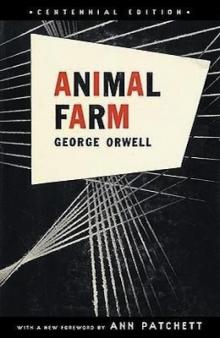 Animal Farm & 1984
Animal Farm & 1984 Homage to Catalonia
Homage to Catalonia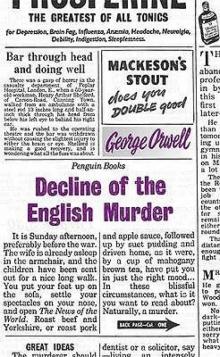 Decline of the English Murder
Decline of the English Murder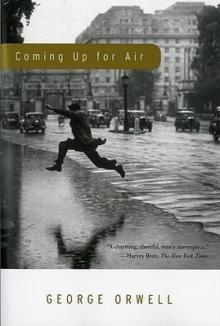 Coming Up for Air
Coming Up for Air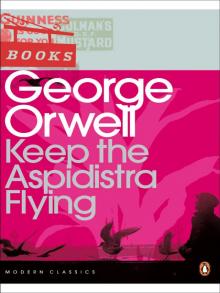 Keep the Aspidistra Flying
Keep the Aspidistra Flying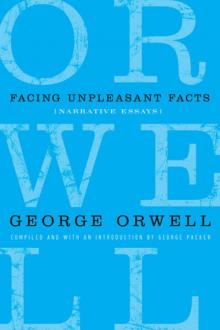 Facing Unpleasant Facts: Narrative Essays
Facing Unpleasant Facts: Narrative Essays The Complete Novels of George Orwell
The Complete Novels of George Orwell All Art Is Propaganda: Critical Essays
All Art Is Propaganda: Critical Essays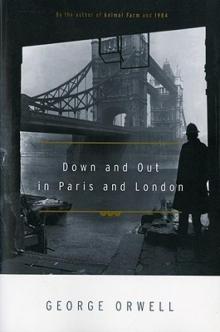 Down and Out in Paris and London
Down and Out in Paris and London Why I Write
Why I Write Nineteen Eighty-Four
Nineteen Eighty-Four A Life in Letters
A Life in Letters Essays
Essays A Clergyman's Daughter
A Clergyman's Daughter Fifty Orwell Essays
Fifty Orwell Essays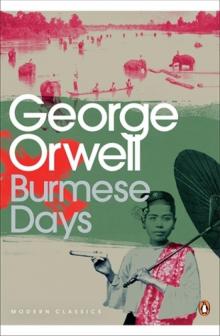 Burmese Days
Burmese Days Shooting an Elephant
Shooting an Elephant 1984 (Penguin)
1984 (Penguin) A Collection of Essays
A Collection of Essays 1984
1984 The Complete Novels
The Complete Novels All Art Is Propaganda
All Art Is Propaganda Orwell in Spain
Orwell in Spain Animal Farm: A Fairy Story
Animal Farm: A Fairy Story Animal Farm and 1984
Animal Farm and 1984